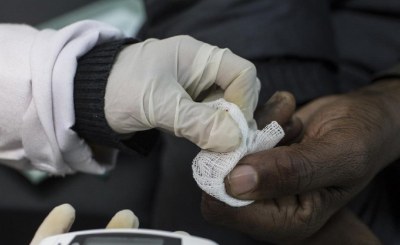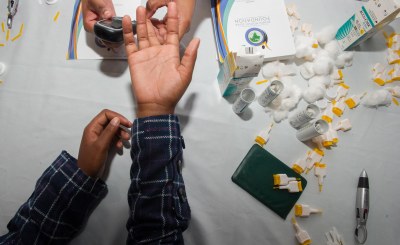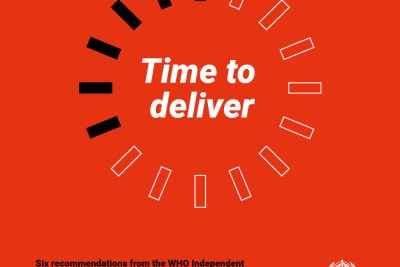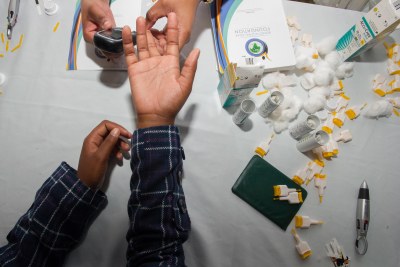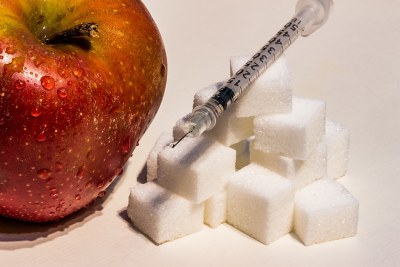-
Liberia: Medicine or Food? People With Diabetes in Liberia Sometimes Have to Choose Between the Two
The Conversation Africa, 5 October 2023
Diabetes is on the rise globally. Since the 1980s the number of people living with the disease has quadrupled from 108 million to 537 million. Read more »
-
WHO, 19 September 2023
Your Excellency Minister Nicolai Wammen, Read more »
-
Nigeria: Diabetes - Remove Tariffs On Essential Drugs Imports, Govt Told
Vanguard, 8 August 2023
As an urgent effort to lower the rising cost of treating non-communicable ailments such as diabetes, cancer, and cardiovascular diseases, among others, the Federal government has… Read more »
-
South Africa: Can South Africa Meet Diabetes Targets, and Would We Know If We Did?
spotlight, 19 June 2023
South Africa has the highest prevalence of diabetes in Africa, according to the International Diabetes Federation (IDF). In 2021, an estimated one in nine adults in the country had… Read more »
-
Nigeria: Nigeria Ranks 37 As Mauritius, Egypt Top Diabetes Prevalence List in Africa
Leadership, 31 May 2023
Mauritius and Egypt have the highest diabetes prevalence in Africa at 22.60 percent and 20.90 percent respectively, according to statistics from Our World In Data. Read more »
Medicine or Food? Tough Choice for Africans with Diabetes
For many years, diabetes was considered a disease of affluence and thought to be rare in sub-Saharan Africa. This is no longer the case. Today 24 million people - one in 22 adults in the region - have diabetes and rates are rapidly increasing, writes Paulina Bleah, Danielle Macdonald, Pilar Camargo-Plazas and Rosemary Wilson for The Conversation Africa.
In Liberia, one of the poorest nations in sub-Saharan Africa, it is reported that an estimated 2.1% of its population of 5.2 million are living with diabetes. More than half of them are undiagnosed, underscoring the grave burden of diabetes in the country.
A new study has found that the two major challenges faced by people with diabetes in Liberia are food insecurity and healthcare neglect. Participants shared stories about worrying about obtaining food, compromising the quality of food they ate, skipping meals and experiencing hunger. They were often forced to choose between food and medication. Participants also reported concerns about the limited food options that healthcare providers recommended for their diet.
According to statistics from Our World In Data, Mauritius and Egypt have the highest diabetes prevalence in Africa at 22.60 percent and 20.90 percent respectively. Nigeria has 3.60 percent diabetes prevalence, making it the 37th highest in Africa. Other African countries with high diabetes prevalence include Sudan (18.90 percent), Tanzania (12.30 percent), Zambia (11.90 percent) and Morocco (9.10 percent). In South Africa, diabetes has reached a crisis point, with the disease being the country's leading underlying cause of death in women and second in the general population.
InFocus
-
Non-Communicable Diseases (NCDs) such as hypertension, diabetes, and stroke< Read more »
-
World Diabetes Day (November 14) provides an opportunity to raise awareness of diabetes as a global public health issue and what needs to be done, collectively and individually, ... Read more »
-
Diabetes and hypertension have become a global burden. Globally, 537 million adults aged 20-79 years live with diabetes. This number is projected to rise to over 700 million by ... Read more »
-
"The collaboration between Novo Nordisk, a global leader in diabetic research and innovation, and Aspen, Africa's largest pharmaceutical manufacturer, will facilitate the ... Read more »

